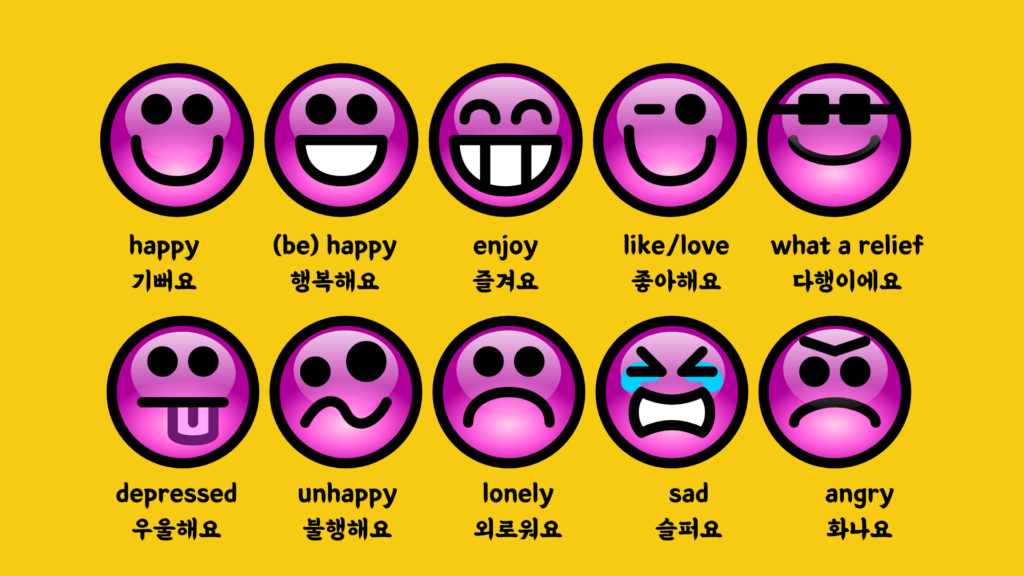
Welcome to our exploration of Korean language and emotion! In this blog, we’ll dive into the fascinating world of Korean vocabulary, focusing on words that capture the essence of various emotions. From the subtle nuances of affection to the profound depths of sorrow, Korean offers a rich tapestry of words that beautifully articulate the spectrum of human feelings. Join us as we unravel the intricacies of these words, gaining insights into Korean culture and enriching our understanding of the universal language of emotion. Let’s embark on this journey together and discover the beauty and power of Korean words.
“Emotions” in Korean
The word for “emotions” in Korean is “감정” (gamjeong). The term “감정” (gamjeong) is used to describe both positive and negative emotions, ranging from joy, love, and excitement to sadness, anger, and fear. It acknowledges the intricate interplay between thoughts, feelings, and bodily sensations that contribute to one’s emotional state.
Primary Emotions in Korean
Joy 기쁨

happy
기쁘다 | 기뻐요
gi bbeu da | gi bbeo yo

(be) happy
행복하다 | 행복해요
haeng bok ha da | haeng bok hae yo

enjoyable
즐겁다 | 즐거워요
jeul geop da | jeul geo wo yo

like/love
좋아하다 | 좋아해요
jo a ha da | jo a hae yo

what a relief
다행이다 | 다행이에요
da haeng i da | da haeng i e yo

satisfied
만족하다 | 만족해요
man jo kha da | man jo khae yo

congratulations
축하하다 | 축하해요
chu kha ha da | chu kha hae yo

grateful/thankful
감사하다 | 감사해요
gam sa ha da | gam sa hae yo

interesting/fun
재미있다 | 재미있어요
jae mi itt da | jae mi i sseo yo

funny
웃기다 | 웃겨요
ut gi da | ut gyeo yo

envy
부럽다 | 부러워요
bu reob da | bu reo wo yo

funny
최고다 | 최고예요
cue go da | cue go ye yo

amazing
대단하다 | 대단해요
dae han ha da | dae dan hae yo
Sadness 슬픔

sad
슬프다| 슬퍼요
seul peu da | seul peo yo

lonely
외롭다 | 외로워요
wae rob da | wae ro wo yo

depressed
우울하다 | 우울해요
wu wul ha da | wu wul hae yo

unhappy
불행하다 | 불행해요
bul haeung ha da | bul haeng hae yo

despair
절망이다 | 절망이에요
jeol mang yi da | jeol mang yi ae yo

sorry
미안하다 | 미안해요
mi an ha da | mi an hae yo

disappointed
실망하다 | 실망해요
sil mang ha da | sil mang hae yo

give up
포기하다 | 포기해요
po gi ha da | po gi hae yo

feel unfair
억울하다 | 억울해요
eo gul ha da | eo gul hae yo
Fear 두려움

fear
두렵다 | 두려워요
du ryeob da | du ryeo wo yo

scary
무섭다 | 무서워요
mu seob da | mu seo wo yo

horrible
끔찍하다 | 끔찍해요
ggeum jjik ha da | ggeum jjik hae yo

(be) frightened
놀라다 | 놀라요
nol la da | nol la yo

scared
겁나다 | 겁나요
geob na da | geob na yo

panic
당황하다 | 당황해요
dang hwang ha da | dang hwang hae yo

nervous
긴장하다 | 긴장해요
gin jang ha da | gin jang hae yo
Anger 분노

angry
화나다 | 화나요
hwa na da | hwa na yo

annoyed
짜증 나다 | 짜증 나요
jja jaung na da | jja jeung na yo

hateful
밉다 | 미워요
mib da | mi wo yo

torment
괴롭다 | 괴로워요
kwae rob da | kwae ro wo yo

unpleasant
불쾌하다 | 불쾌해요
bul kwae ha da | bul kwae hae yo

mad
미치다 | 미쳐요
mi chi da | mi chyeo yo

burn with anger
열받다 | 열받아요
yeol bad da | yeol bad a yo

upset
속상하다 | 속상해요
sog sang ha da | sog sang hae yo

bad mood
기분 나쁘다 | 기분 나빠요
gi bun na bbeu da | gi bun na bba yo

furious
분노하다 | 분노해요
bun no ha da | bun no hae yo
Confusion 혼란스러움

chaotic
혼란스럽다 | 혼란스러워요
hon ran seu reob da | hon ran seu ro wo yo

unsure
불확실하다 | 불확실해요
bul hwak sil ha da | bul hwak sil hae yo

anxious
불안하다 | 불안해요
bul an ha da | bul an hae yo

worry
걱정하다 | 걱정해요
geog jeong ha da | geog jeong hae yo

confused
헷갈리다 | 헷갈려요
haet gal li da | haet gal lyeo yo
Shyness 부끄러움

embarrassed
창피하다 | 창피해요
chang pi ha da | chang pi hae yo

timid
소심하다 | 소심해요
so sim ha da | so sim hae yo

humble
겸손하다 | 겸손해요
gyeom son ha da | gyeom son hae yo

unconfident
자신 없다 | 자신 없어요
ja sin eob da | ja sin eob so yo
Hurt 아픔

jealous
질투하다 | 질투해요
jil tu ha da | jil tu hae yo

betray
배신하다 | 배신해요
bae sin ha da | bae sin hae yo

disappointed
실망하다 | 실망해요
sil mang ha da | sil mang hae yo

get hurt
상처받다 | 상처받아요
sang cheo bad da | sang cheo bad a yo

injured
다치다 | 다쳐요
da chi da | da chyeo yo

heartbroken
가슴 아프다 | 가슴 아파요
ga seum a peu da | ga seum a pa yo

be cheated
사기당하다 | 사기당해요
sa gi dang ha da | sa gi dang hae yo

be bullied/boycotted
왕따 당하다 | 왕따 당해요
wang dda dang ha da | wang dda dang hae yo

painful
아프다 | 아파요
a peu da | a pa yo
Tiredness 피곤

have no energy
기운이 없다 | 기운이 없어요
gi un i oeb da | gi un i eob seo yo

fatigued
지치다 | 지쳐요
ji chi da | ji chyeo yo

collapse
쓰러지다 | 쓰러져요
seu ro ji da | seu reo jyeo yo

tired
피곤하다 | 피곤해요
pi gon ha da | pi gon hae yo
In closing, our journey through Korean emotions has shown us how people express their feelings using words. Whether it’s feeling happy, sad, or anything in between, Korean has words for it all. We’ve learned that emotions are something everyone experiences, no matter where they’re from. By learning about Korean emotions, we not only understand the language better but also learn more about each other. Let’s remember the importance of words in sharing how we feel and building connections with others around the world.
Table of Contents

